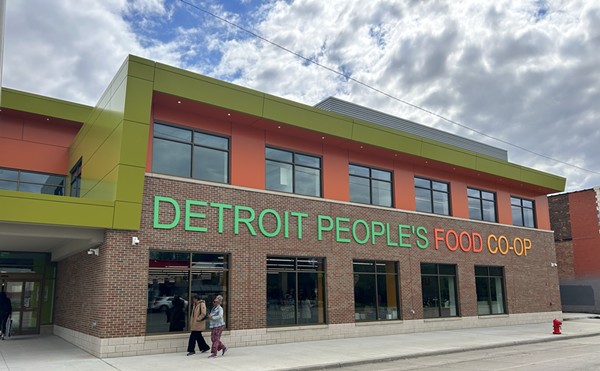In the media, the notion that Detroit proper is a “food desert” has been — perhaps unfairly — a long-held view. There are no major grocery chains left inside the city limits, they say, and vast swaths of the city have limited access to nutritious food options.
Even if the statistics support that belief — that Detroiters lack easy access to healthy produce and other raw foodstuffs — the very idea ignores how Eastern Market bustles with shoppers on a Saturday, or the brisk trade at the 80-odd “full-service” stores making up the Detroit Independent Grocers Association. Yet, according to a recent declaration by Detroit Mayor Dave Bing, city dwellers are spending $200 million annually on grocery trips to the burbs — a sum Bing would surely love to keep inside city limits.
If you do believe in the food desert narrative, then it would appear that a veritable oasis has suddenly sprung up, with upscale grocery chain Whole Foods opening the doors to its new location in Midtown on June 5.
Or not.
Having Whole Foods (or “Whole Paychecks,” as the joke goes) open an upscale organic and natural grocery store in one of the nation’s most economically embattled cities likely won’t resolve the food desert debate. The move into Detroit appears to be a calibrated business decision, but not without risk, as the grocer’s target market seems narrowly tailored toward Midtown’s burgeoning middle-class resident professionals and college student population.
It is a venture that also comes with a hefty price tag — an oft-cited report by Crain’s Detroit Business estimates the move to Detroit was only made possible by at least $4.2 million in city, state, and federal tax incentives and grants.
If Detroit is investing in Whole Foods, it is perhaps for good reason — the chain has a reputation for signaling economic change in communities when it moves in. Call it the Whole Foods Effect: Neighborhoods in Washington, D.C., New Orleans, Pittsburgh and Boston all experienced revivals that seemed to follow the grocer’s arrival.
Could Detroit be next? “We chose Detroit because there are amazing things happening in Detroit,” says Larry Austin, the new Detroit Whole Foods Market’s store team leader, in an email. “There is an excitement about food in Detroit, about growing and making food, and we wanted to be a part of that excitement.”
The chain reportedly studied the area for more than two-and-a-half years before making the decision to break ground and build the 21,000-square-foot store on a vacant lot north of Mack, between Woodward Avenue and John R.
For its part, Whole Foods appears interested in investing in Detroit as well. The store has made a point to broadcast the array of locally made products that will be available, including McClure’s Pickles, Germack Coffee and Avalon Bread, among others. The company helped with a loan for Avalon’s recent move to a larger bakery on the east side, an expansion that enables the Midtown-born Avalon to now supply the majority of bread and baked goods to not only the Midtown Whole Foods location but to the chain’s other five Michigan stores as well.
Whole Foods has also funded major renovations to Eastern Market, which includes the construction of a new community kitchen, and co-CEO Walter Robb reportedly became so enamored with Eastern Market that he made a personal donation to help pay for new signs.
In addition, the store features a second level that includes a community meeting space and plans to offer classes for educating shoppers how to shop on a budget. “Some of our stores have community classrooms, others do not,” Austin explains of the feature. “We are excited that we were able to design this store to include a community room. Community groups have already begun reserving the space for their meetings and events,” in advance of the store opening, he said.
But to some Detroiters, the arrival of a Whole Foods is a signal of the looming, ugly threat of gentrification. The Whole Foods deal was partly made possible by the public-private partnership of the Detroit Economic Growth Corporation, whose president and CEO, George W. Jackson Jr. said at an economics forum at the Grosse Pointe War Memorial: “When I look at this city’s tax base, I say bring on more gentrification.”
The DEGC, along with downtown giant Quicken Loans’ parent company Rock Ventures, recently unveiled a joint long-term plan to develop downtown over the next decade — developments that they likely aim to profit from.
This comes as hundreds as residents have been ordered to move out of apartment buildings in the Cass Corridor, recently purchased by an unknown buyer (a new hockey arena is believed to be in the works).
In response to these developments, a group of activists recently hijacked nearby billboards emblazoned with Rock Ventures’ “Opportunity Detroit,” changing the message to simply “Gentrify Detroit.”
It will be interesting to see if Whole Foods’ Midas touch can work on Detroit — and at what cost.
Lee DeVito writes about art, culture and business for Metro Times. Send comments to [email protected]






